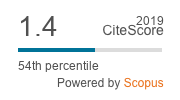Effects of active learning methodologies on the students’ emotions, self-efficacy beliefs and learning outcomes in a science distance learning course
Abstract
Distance education programs in higher education are gaining popularity mostly due to the flexibility of the formative programs to fit all the requirements that brick-and-mortar educational institutions are not able to provide to students. However, quite often these distance programs report feelings of isolation, lack of self-direction and management, and eventual decrease in motivation levels. Thus, the main aim of this research is to assess the effect of following an active learning methodology on the students’ emotions, self-efficacy beliefs and learning outcomes in the context of a distance learning program in an Atmospheric Pollution course. According to the results, the use of these methodologies not only had a significant promotion in the positive emotions and self-efficacy beliefs, but also positive impact in the students’ learning outcomes. The results obtained in this research demonstrate that following an appropriate learning methodology in a distance program could contribute to reduce the main handicaps of these programs.
Keywords
active learning, distance learning, emotions, self-efficacy, science education.
DOI: https://doi.org/10.3926/jotse.530
This work is licensed under a Creative Commons Attribution 4.0 International License
Journal of Technology and Science Education, 2011-2024
Online ISSN: 2013-6374; Print ISSN: 2014-5349; DL: B-2000-2012
Publisher: OmniaScience







